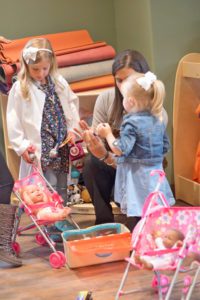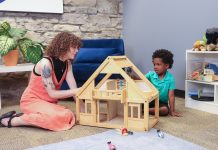This post is sponsored by our partner Little Sunshine’s Playhouse & Preschool®.
I don’t know about you, but the most vivid memories I have of my childhood are the moments I created from my imagination. The pretend moments. From an early age, I have memories of pretending to be a mom and caring for my baby dolls as if they were real. Or I would hide out in our secret closet underneath the basement stairs where I would play school and pretend to be a teacher preparing her lesson plans, grading papers or instructing her students. 
My best friend and I would make afternoons of pretending to be boxcar children, just like in the books, living for the thrill of adventure on the run. My own daughter is a brand new two-year-old and she loves to role play and mimic. Even though it makes me cringe when she tries to give a drink of milk to her stuffed lamb 🙂 It’s amazing to me how young this started and how real these situations are to her!
Little did I know that in spending all of that time pretending as a child myself, those moments were actually helping me to learn, too! Just like my daughter. Little Sunshine’s Playhouse & Preschool® recognizes firsthand the importance of fostering creativity and role-play and have built this specifically into their preschool curriculum.
Here are some crazy stats to wrap your mind around:
- People remember 10% of what they read
- 20% of what they hear
- 30% of what they see
- 50% of what they see and hear
- 90% of what they see, hear and DO
 Role-play and drama fixes the child as an active participant in the learning process instead of just a passive observer. Drama and role-play in particular, promote learning in the following ways:
Role-play and drama fixes the child as an active participant in the learning process instead of just a passive observer. Drama and role-play in particular, promote learning in the following ways:
- Cognitive development. A lesson about animals could include mimicking the sounds and behaviors of dogs, cats, horses and other creatures. Acting out the content helps children understand new skills and concepts by practicing them hands-on. It also encourages them to use their imaginations to develop original ideas.
- Emotional development. Role-playing, such as “playing” doctor and other careers, gives children a safe space to explore the appropriate emotional reactions to different types of situations. This can prepare the student to deal with the ups and downs we all encounter in daily life.
- Development of motor skills. Another great example of dramatic play is letting kids act out the lyrics to a song, which getseveryone out of their seats so they can practice all-important skills like running, jumping, clapping, dancing, crawling, climbing or even using everyday items as props.
- Social development. Drama lets children implement class material in cooperation with their peers and teachers. They learn to examine different social roles and develop empathy for the characters in the story as well as the people they meet in real life.
- Language and reading skills. Storytime is more fun when children get to act out the characters. Students can use their own words and actions to portray the personalities of, say, the Three Little Pigs and the Big Bad Wolf. It helps to build stronger connections between the words in the text and the characters, objects and activities they describe.
- Problem solving. Pretend play is a great vehicle for critical thinking. If the Three Little Pigs need to build a house, how will they build it? How big will it be? What should the house be made of? Open-ended questions tap into children’s natural curiosity and provide a safe space for trying out ideas and revising them.
- Learning across subjects. When kids portray the Little Pigs building their house, they’re also engaging in subjects like science and engineering (Why is the brick house stronger than the straw house?) and math (How big should the house be?). According to the National Association for the Education of Young Children, performing arts like drama, music and dance can boost learning in non-arts subjects.
Little Sunshine’s Playhouse and Preschool® curriculum, Creatively Shine™, emphasizes hands-on activities and project-based learning, and drama is one of many ways to make learning fun and memorable for all students. Some locations also include theater stages for school productions, too! You can count on Little Sunshine’s Playhouse, as always, to find ways to engage your child in creative ways, help foster their imagination and pave the way for the future!










